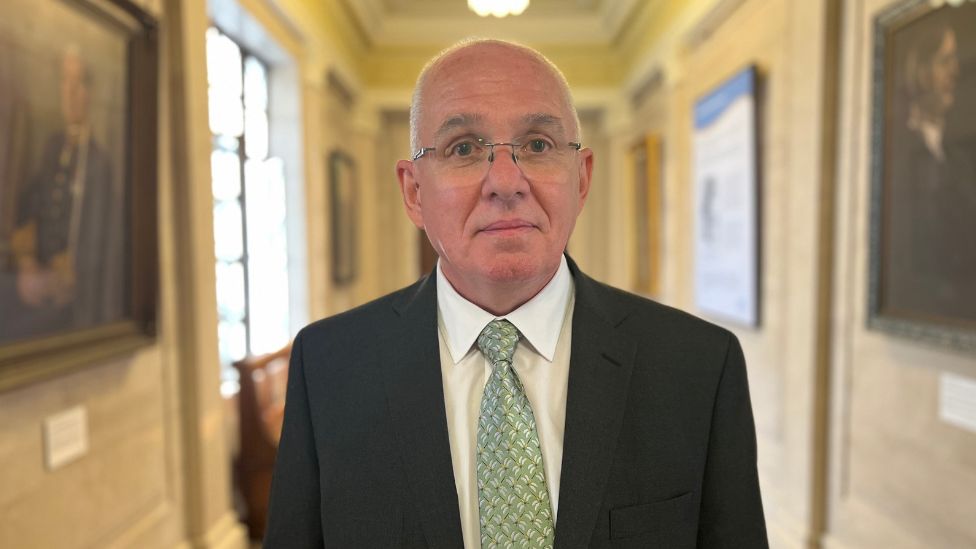ARTICLE AD BOX

Paul Wilson, whose father was murdered 50 years ago, has called the legacy bill "wrong and unfair"
By Jayne McCormack & Julian O'Neill
BBC News NI
The son of a nationalist senator murdered by loyalist paramilitaries has urged the government to scrap its contentious Troubles legacy bill immediately.
Paul Wilson was speaking on the 50th anniversary of Paddy Wilson's death.
He was killed along with a friend, Irene Andrews.
The bill is opposed by all Northern Ireland political parties, as well as groups representing bereaved families and victims of the Troubles.
On Monday, Lords backed a Labour amendment by a majority of 12 - it would prevent anyone from requesting immunity from prosecution as part of future investigations.
It is due to complete its passage in the Lords later and then be sent back to the Commons, which could vote to put the immunity measure back in.
'Wrong and unfair'
Paddy Wilson was a member of the Northern Ireland Senate and a founding member of the Social Democratic and Labour Party (SDLP) and was murdered on the night of 25-26 June 1973.
On Monday, a commemoration service was held for him and Ms Andrews at Stormont.
His son, Paul, said he believed the bill would not provide justice for anyone.
"If you're guilty of a crime during the Troubles - you stand and face the court. We need closure, this bill is wrong and unfair," he told BBC News NI.
"Let's be honest, we've got a government that is doing this for self-interest."
Stormont honoured Paddy Wilson with a memorial stone in 2001
The government maintains that under its new body, the Independent Commission for Reconciliation and Information Recovery (ICRIR), families would still be able to access justice.
The ICRIR would be "under a new duty to offer victims and their families the opportunity to submit personal impact statements".
Mr Wilson was stabbed 32 times while Ms Andrews, a Protestant woman, was stabbed 19 times.
John White of the Ulster Freedom Fighters was convicted of their murders in 1978.
In 2001, Stormont honoured Mr Wilson with an inscription outside the wall of the old Senate chamber, which reads: "Equality, tolerance, respect."
His son was joined by other families bereaved during the Troubles as well as SDLP politicians past and present during the event.
Gerry Adams seeking damages
Meanwhile, it has emerged the government is preparing an amendment to the Legacy Bill which would block former Sinn Féin leader Gerry Adams and others from obtaining damages over their detention without trial in the 1970s.
Northern Ireland Office minister Lord Caine said the government is "extremely sympathetic" to a proposal which would bar them from receiving compensation.
He told the House of Lords an amendment to the bill will be brought forward next week.
Mr Adams is seeking damages after the UK Supreme Court quashed two historical convictions related to attempted escapes during internment.
Lord Caine said Mr Adams' case has led to between 300 and 400 other people pursuing similar claims.
Image source, PAcemaker
Image caption,Gerry Adams is seeking damages after the UK Supreme Court quashed two historical convictions
In 2020, the court ruled Mr Adams' convictions be overturned because his detention was unlawful.
It found there had been an error in the process authorising his detention, because the interim custody order used to detain him in 1973 was not authorised by Willie Whitelaw, the then Northern Ireland secretary.
The ruling called into question the Carltona principle, which allows government officials to exercise the power of ministers.
Lord Caine told peers on Monday: "It would not be appropriate for the government to give an opinion on the Supreme Court and Adams, but we are of the view that this judgement, which was unexpected, has led to a degree of confusion.
"I will commit to bringing forward an amendment next week following consideration by officials and lawyers that addresses these matters."
Earlier during a debate on the bill, a cross-bench peer, Lord Butler, said: "All that has happened is that the Supreme Court found it was a procedural error.
"That is not circumstances where a government, which is careful about how it spends public money, should be providing compensation."

 1 year ago
53
1 year ago
53








 English (US) ·
English (US) ·